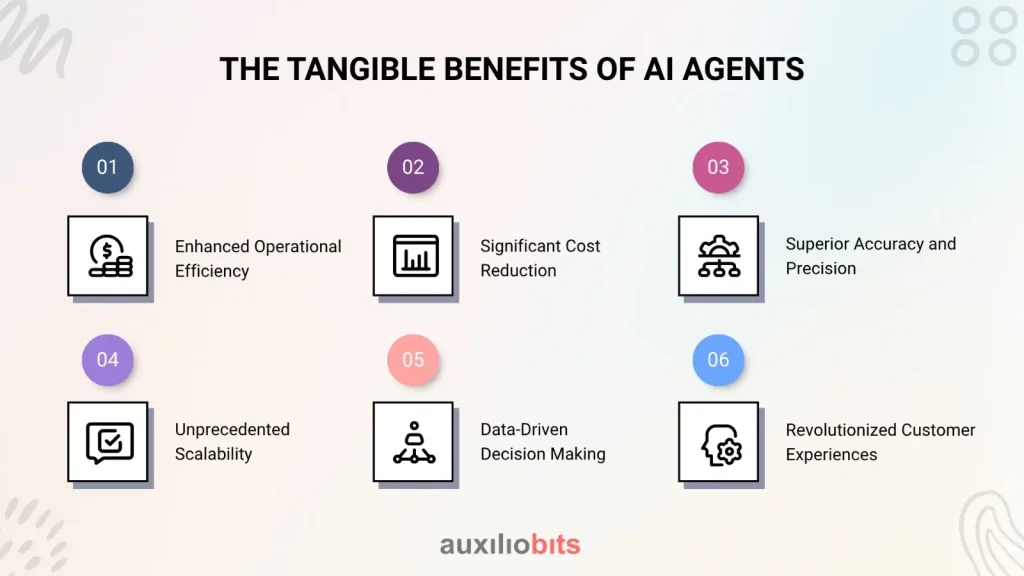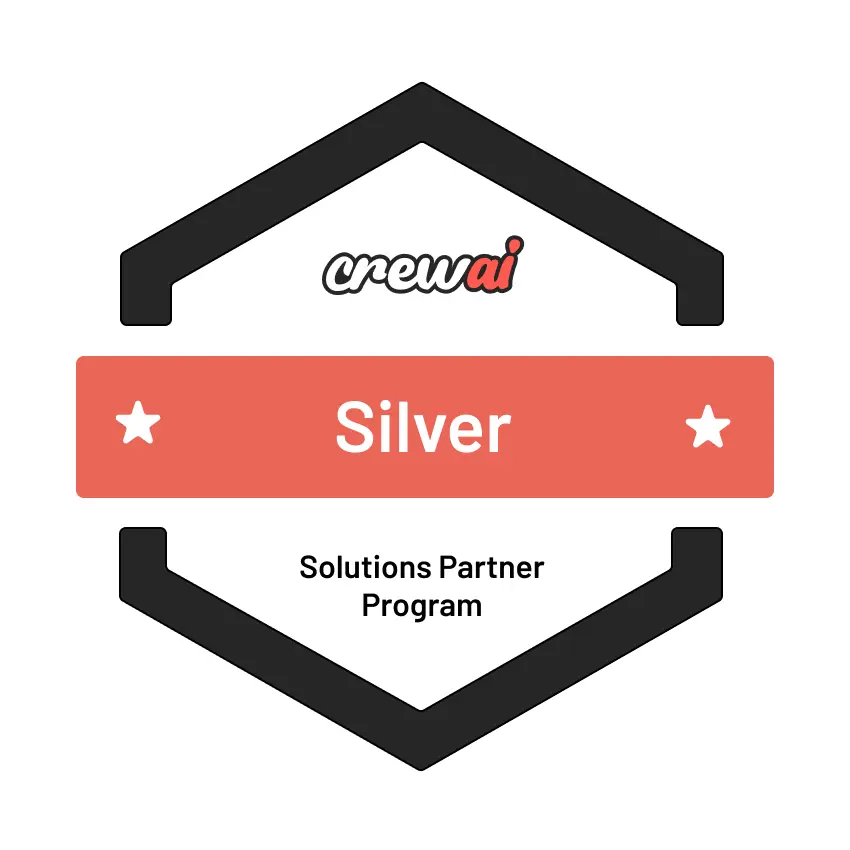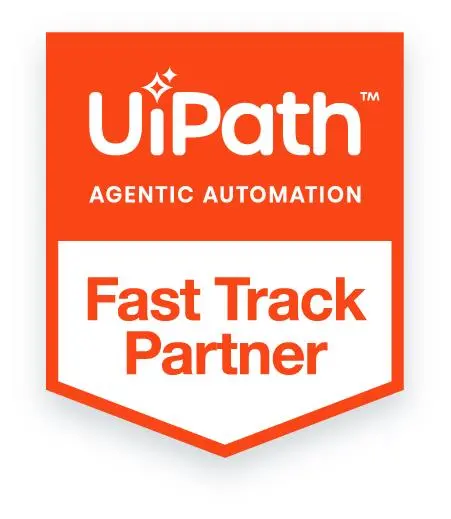
Key Takeaways
- AI agents go far beyond simple automation, using perception, reasoning, and adaptation to autonomously complete complex tasks.
- They are powered by machine learning, NLP, and advanced algorithms, enabling them to operate in dynamic environments with minimal human input.
- Businesses deploying AI agents gain efficiency, cut costs, reduce errors, and scale operations effortlessly.
- Industries like finance, healthcare, logistics, and HR are already seeing real-world value from AI agent-driven transformation.
- Strategic implementation—including high-quality data, ethical safeguards, and workforce readiness—is critical for long-term success with AI agents.
When we talk about artificial intelligence in today’s time, it is more than a tangible force that is reshaping several industries. However, in this transformation, AI agents have played an essential role. Some assume that AI agents are simple automated scripts. But is this the reality? AI agents are well-trained to perform tasks. Without seeking human help, they make sure that a firm can not only fulfill its business requirements but also accomplish its goals.
At their core, AI agents are powered by a combination of beneficial technologies that offer outstanding perks. They are:
- Machine Learning Models: These allow AI agents to learn from data. Additionally, it also allows them to make predictions or take decisions without explicit programming for every certain situation.
- Natural Language Processing: This allows AI agents to understand, interpret, and generate human language. As a result, it facilitates seamless communication with users and unstructured data.
- Advanced Algorithms: These offer logic and computational power for AI agents so that they can process information and execute the allotted tasks.
Also read: How are AI Agents Driving Business Ecosystems with Less Input?
How AI Agents Function: A Continuous Loop
Do you want to understand how AI agents work? Well, it is a long procedure that consists of the following:
- Perception:
AI agents can easily collect data from several sources, considering a defined environment. So whether you want to collect readings from sensors or gather financial data, AI agents can handle it all. - Reasoning:
With the help of algorithms and machine learning models, AI agents ensure that all the data is analyzed. It helps in examining patterns, drawing insights, and evaluating potential courses of action. - Actions:
Considering the reasoning, an AI agent ensures that all the allotted tasks are completed. However, if there is any situation where an action is needed, AI agents also help with a suggestion. So whether you want to identify an anomaly, process a transaction, or send an email, AI agents can consider these actions and give a suitable solution. - Learning & Adaptation:
Critically, the agent learns from the outcomes of its actions. Feedback loops allow it to refine its performance over time, becoming more efficient, accurate, and effective with each iteration. This adaptive quality is what makes AI Agents so powerful and differentiates them from rigid, rules-based systems.
The Tangible Benefits of AI Agents
The adoption of AI Agents offers a compelling array of benefits for organizations striving to enhance operational efficiency, reduce costs, and drive sustainable growth:

Enhanced Operational Efficiency:
Imagine mundane, repetitive tasks—like data entry, invoice processing, or routine customer inquiries—being handled entirely by AI Agents. This frees up your most valuable asset: your human workforce. Employees can then dedicate their time and intellectual capital to higher-value activities requiring creativity, strategic thinking, and emotional intelligence. The result is faster task completion, significantly reduced errors, and a dramatic boost in overall productivity.
Significant Cost Reduction:
By automating processes that traditionally required substantial manual labor, businesses can realize considerable savings. AI Agents don’t require salaries, benefits, or breaks; they can work 24/7. This maximizes resource utilization and minimizes downtime, directly impacting your bottom line by reducing operational overheads.
Superior Accuracy and Precision:
Human error is an inevitable part of any manual process. AI Agents, however, operate with unwavering precision. In critical areas such as financial transactions, large-scale data entry, quality control in manufacturing, or medical diagnostics, their ability to eliminate errors leads to dramatically higher accuracy, reducing costly mistakes and improving reliability.
Unprecedented Scalability:
One of the most compelling advantages is the ability to scale operations effortlessly. Whether your business experiences a sudden surge in demand or needs to expand into new markets, AI Agents can be rapidly scaled up or down without the complexities of extensive retraining or additional hiring. This agility allows businesses to respond swiftly to market shifts and capitalize on emerging opportunities.
Data-Driven Decision Making:
AI Agents excel at processing and analyzing vast, complex datasets that would overwhelm human analysts. By identifying subtle patterns, correlations, and trends often invisible to the human eye, they provide profound insights. These insights empower business leaders with objective, data-driven recommendations, enabling more informed strategic planning, risk assessment, and resource allocation.
Revolutionized Customer Experiences:
AI Agents are the backbone of intelligent chatbots and virtual assistants that provide instant, personalized support to customers around the clock. They can efficiently handle a wide range of inquiries, resolve common issues, and even offer tailored product or service recommendations based on individual customer profiles. This leads to immediate responses, reduced wait times, and ultimately, a significant uplift in customer satisfaction and loyalty.
Real-World Impact: AI Agents in Action Across Industries
AI Agents are not theoretical concepts; they are actively transforming operations across a diverse range of industries:
Customer Service:
Beyond basic chatbots, advanced AI Agents can understand customer sentiment, prioritize urgent issues, and even proactively offer solutions before a customer explicitly asks. They integrate with CRM systems to provide personalized service history, making interactions seamless and efficient.
Finance & Banking:
AI Agents are indispensable for fraud detection, analyzing billions of transactions in real-time to spot anomalous patterns. They also excel at algorithmic trading, executing trades based on complex market analysis, and assist in credit scoring and risk assessment, making lending decisions more objective and efficient.
Healthcare:
In healthcare, AI Agents are revolutionizing diagnostics by analyzing medical images (X-rays, MRIs) with high accuracy, often identifying conditions earlier than human eyes. They also play a crucial role in personalized medicine, analyzing patient data to recommend tailored treatment plans, and streamlining administrative tasks like appointment scheduling and medical record management.
Manufacturing & Logistics:
AI Agents optimize complex supply chains by predicting demand fluctuations, managing inventory levels, and optimizing shipping routes. In manufacturing, they enable predictive maintenance by monitoring equipment for signs of failure, preventing costly downtime. They also automate quality control, identifying defects on production lines with speed and precision.
Human Resources:
AI Agents are transforming HR processes from end to end. They can streamline recruitment by automating resume screening, scheduling interviews, and conducting initial candidate assessments. For existing employees, they can manage benefits inquiries, provide onboarding support, and even analyze employee feedback to improve workplace satisfaction.
Implementing AI Agents: A Strategic Roadmap for Business Leaders
Successfully integrating AI Agents into your business requires a thoughtful and strategic approach, moving beyond mere technological adoption to a true transformation of your operations:
1. Identify High-Impact Opportunities:
Don’t just implement AI for AI’s sake. Begin by conducting a thorough analysis of your current business processes. Pinpoint areas characterized by repetitive tasks, data-intensive workflows, bottlenecks, or significant decision-making challenges. These are the prime candidates where AI Agents can deliver the most immediate and substantial value. Look for processes that are costly, time-consuming, or prone to human error.
2. Embrace a Pilot Project Mindset:
Rather than a large-scale, all-at-once deployment, consider starting with a small, manageable pilot project. Choose a specific workflow or department and implement an AI Agent solution there. This allows you to test the waters, evaluate performance in a real-world scenario, gather critical insights, and make necessary adjustments without significant risk or investment. Learn, iterate, and refine before scaling up.
3. Prioritize Data Quality and Accessibility:
AI Agents are only as intelligent as the data they consume. Clean, accurate, structured, and easily accessible data is the lifeblood of effective AI. Invest in data governance, data cleaning processes, and establish robust data pipelines. Poor quality data will inevitably lead to biased, inaccurate, or ineffective AI Agent performance.
4. Plan for Seamless Integration:
AI Agents rarely operate in a vacuum. They need to integrate seamlessly with your existing IT infrastructure, enterprise systems (e.g., ERP, CRM), and legacy applications. Develop a clear integration strategy to ensure data flows smoothly, avoiding operational disruptions and maximizing the agent’s utility within your current ecosystem.
5. Invest in Workforce Training and Upskilling:
The rise of AI Agents doesn’t eliminate the need for human employees; it changes their roles. Your workforce will need to collaborate effectively with AI. Invest in training programs that educate employees on AI’s capabilities, limitations, and how to work alongside these intelligent systems. This upskilling ensures that humans can focus on strategic oversight, problem-solving, and tasks that require uniquely human skills.
6. Address Ethical Considerations Proactively:
As with any powerful technology, AI comes with ethical responsibilities. Business leaders must proactively address critical considerations such as data privacy and security, algorithmic bias (ensuring fairness and equity in decision-making), and accountability (establishing clear lines of responsibility when AI Agents make errors). Implementing robust ethical guidelines and regular audits is paramount.
The Future of Work: A Symbiotic Partnership with AI Agents
AI Agents are not merely tools; they represent a fundamental shift in how businesses operate. They are poised to usher in an era where intelligent workflows are the standard, rather than the exception. By strategically embracing this technology, business leaders can unlock unprecedented levels of efficiency, significantly reduce operational costs, enhance decision-making capabilities, and consistently deliver superior customer experiences.
The transition towards intelligent workflows powered by AI Agents is not just an incremental improvement; it’s a fundamental transformation that will redefine competitive advantage in the digital age. Organizations that proactively adopt and skillfully integrate AI Agents will be better positioned to innovate faster, adapt more quickly to market changes, and ultimately, thrive in the future of work.
Are you ready to redefine your business operations with the power of AI Agents? The time to embrace intelligent workflows is now.








